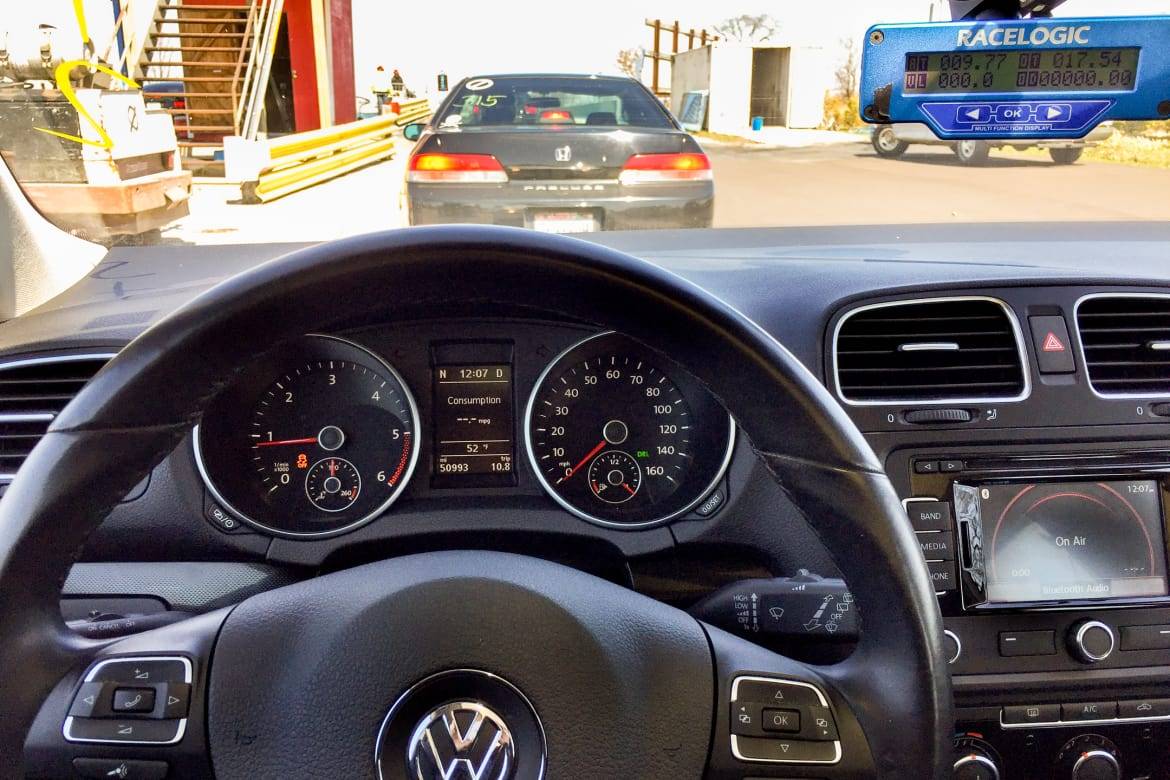How Fast Is Our 2013 Volkswagen Jetta SportWagen TDI Before A Fix?


CARS.COM — When former Volkswagen of America CEO and president Michael Horn gave very preliminary details regarding a remedy to Volkswagen’s TDI diesel emissions scandal, he said a fix for the cars might impact performance and top speed. We’re not too concerned about our TDI’s top speed, but our car’s impressive acceleration is a defining characteristic compared with other fuel-efficient vehicles. Before a fix is announced and implemented, we wanted to take a baseline of our SportWagen TDI’s performance, measuring zero-to-60 mph times and quarter-mile acceleration times and speeds.
Related: More VW TDI Diesel Scandal News
Pre-recall, a zero-to-60 mph sprint in the SportWagen takes 8.4 seconds and the quarter-mile 16.3 seconds at 84.6 mph. Our best results came by putting the six-speed automatic transmission in Sport mode and raising engine speed to roughly 2,100 rpm by overlapping brake and accelerator pedals before launching. The SportWagen TDI excitedly chirped its Michelin Primacy MXM4 tires for a few feet, but there wasn’t a noticeable loss of forward momentum. Acceleration lag from a standstill is painful without loading the engine against the brakes from a stop. It takes a second for the turbocharged engine to build steam before the wagon moves forward with any vigor. When we simply mashed the accelerator pedal from a stop, we lost over a full second in the 60 mph sprint: 9.77 seconds compared with our best time of 8.4 seconds.
Acceleration lag is a non-issue at cruising speeds where the TDI quickly responds to passing commands even without the transmission in Sport mode, though that certainly helps. The TDI’s generous torque from the turbocharged 2.0-liter four-cylinder diesel moves the 3,340-pound wagon with immediacy at highway speeds of 60-70 mph like there’s a bigger-displacement engine under the hood.
The Jetta SportWagen TDI’s acceleration isn’t impressive on its own until you consider the notable fuel economy paired with the torquey engine and responsiveness of the powertrain at speed. These qualities mean little at the moment, however, considering Volkswagen’s emissions testing “defeat” strategy. In regular driving, the car’s software dials back its emission equipment’s effectiveness and emits nitrogen oxide levels up to 40 times the amount allowable by the EPA. A big question is whether our SportWagen TDI will keep its noteworthy power, performance and fuel economy if a remedy to bring emissions into compliance is approved and implemented.
How We Conducted the Testing
All acceleration data was recorded at Great Lakes Dragaway in Union Grove, Wis. with a RaceLogic VBOX II GPS data logger. The weather during our testing saw a high of 52 degrees, but data was not corrected for atmospheric conditions. We used the drag strip’s method of measuring quarter-mile acceleration with a 1-foot rollout accounting for the distance a front wheel moves in the timing beam before rolling out of the beam and triggering the timing system, which is typically a few tenths faster than not including rollout. Zero-to-60-mph times were raw times from a standstill and do not include a 1-foot rollout.

Managing Editor Joe Bruzek’s 22 years of automotive experience doesn’t count the lifelong obsession that started as a kid admiring his dad’s 1964 Chevrolet Corvette — and continues to this day. Joe’s been an automotive journalist with Cars.com for 16 years, writing shopper-focused car reviews, news and research content. As Managing Editor, one of his favorite areas of focus is helping shoppers understand electric cars and how to determine whether going electric is right for them. In his free time, Joe maintains a love-hate relationship with his 1998 Pontiac Firebird Trans Am that he wishes would fix itself. LinkedIn: https://www.linkedin.com/in/joe-bruzek-2699b41b/
Featured stories




